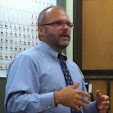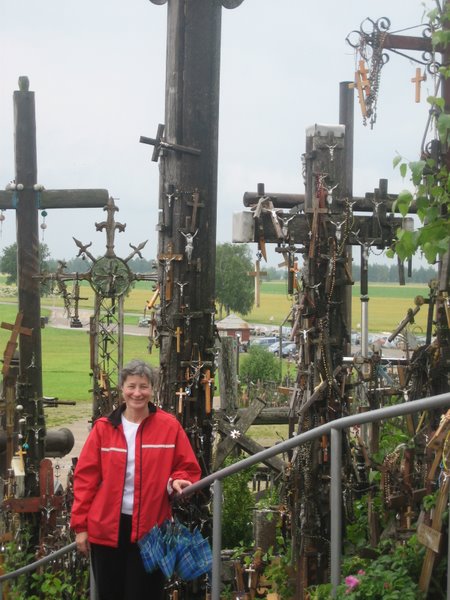During our orientation we got a letter from the previous chaplain about religion in Lithuania. A good bit of the letter reminded us to think about religion in the context of the cultural landscape in Lithuania. First, religious forms and behavioral expectations are not necessarily what we might expect. While heavily Catholic, Lithuanians will likely have a more social orientation to their religion. You don’t have to think about it much, because if you’re Lithuanian, you’re Catholic. As for attitudes and behaviors, well, let’s just say, they either take their Christian liberties in healthy doses, or “religion” has little real constraint on behavior at all. Perhaps this distinction is what the chaplain was trying to get across; religion, in the forms and general norms, seems practiced more readily than active faith, and religion doesn’t seem to take a lot of thought or effort, since the form is so readily accessible, both in the psyche and the church building.
Second, the chaplain pointed out, Lithuanians, and this is particularly acute for young Lithuanians, are struggling to navigate the shifting social, cultural, and spiritual realities of life in a post-modern materialist society. I have to say, this threw me.
When I think of post-modern, I think, as the chaplain indicated, of a social environment where each writes his own rules, and society, or the government, or any other institutions of order/constraint/expectation are relegated to the dustbin of history. If we were everywhere born free, but are now in chains, the only way to recapture that freedom is to refuse to be under authority; instead, to author life and relationships as we choose, without judgment from or by someone else, least of all God.
Modern life, by contrast—at least as it seems to me (and someone please “explain me,” if I’m wrong)—accepts that our lives are structured, orderly, bureaucratic, hierarchical (socially, economically, politically, even spiritually), and these are not necessarily bad things. I think of Adam Smith arguing that by the market’s ordering of our selfish impulses, we get a better collective outcome than before (the market did this ordering)—higher volumes of the things we need, at lower prices; freer time and capacity to pursue those other things that specialized and divided labor cannot produce (life and liberty?). I think of Enlightenment ideas about popular sovereignty…there is still something sovereign, all authority is not simply dismissed as immoral. Rather, the best kind of authority is popular authority.
And here’s where my wits fail me. The Modern life, according to its own intent, has focused on maximizing the material—the tangible goods and services; the measurement of happiness in real and monetary terms, etc. I grew up hearing this called materialism, too much of it being a bad, because selfish, thing. The Post-modern life, though I guess it can be anything since nothing has meaning except that which we ascribe to it (the something), seems most characterized by a degree of post-materialism, too. “We have plenty, but we still haven’t really found truth or Truth, and certainly not fulfillment.” We must, therefore write for ourselves a new order that allows us to (re)claim those “higher” things that elevate the quality of our lives. Whether these higher values actually mean anything is unclear. And whether people or governments can actually met the goals is unlikely.
For me, this Modern to Post-modern trajectory follows the historical arc of the “Live” benefit shows. In the 1980s, Live Aid aimed to feed starving people in Africa by getting all of us viewers to donate money. A couple of years later, the Amnesty International shows (a close cousin of the “Live” shows) sought to secure real and tangible political freedoms for people imprisoned by dictators (both right and left) by raising awareness and thereby participation in activist campaigns. More calories, and more civil rights—the tangible demands of the Modern.
By 2005, when life was still distressingly unfulfilled (and here my Political History background clouds my view, as I say, after the Cold War, when post-communism was discovered to have its own set of seriously disappointing flaw—for the West that the triumph wasn’t really so great, for the East that the new life isn’t as sweet as was promised…students tell me that to get a doctor to see you or a nurse to help in a hospital, you have to slip them a little extra money, just like the old days) Live 8, asks practically nothing of its viewers, and instead uses the concert event to call on governments to set collective aid targets that mean little to the starving people on the ground. Debt relief and aid packages might help, though they are very bureaucratized and inefficient. (How very Modern.) And just last week, Live Earth, where you could visit the concert web site to sign a pledge to cut your own carbon output, sounds the death knell of any meaningful large-scale action. I know that my PC doesn’t take all that much power, but that extra carbon America spews out (over and above our output of, say, 20 years ago) comes from somewhere… and it’s your and my consumption.
So, whatever you might think of rock stars agitating to change the world, in a more Modern setting, they at least aimed at something tangible about real people’s lives. In the Post-modern, you get Bono (upon his honorary knighthood) saying how great it is that all the European countries have committed to the 0.7% of GDP aid target. What’s the URL—I want to log my support for this monumental moment.
What’s this have to do with Lithuania, you say? Well, I’ll tell ya…I’ll tell ya what it has to do with Lithuania. In the simplest form, the question, for me, is this: What happens when a society goes from near-Modern (almost-Modern?), or nearly Modern in the material sense, strangely Modern in the organizational sense, and over-Modern in the spiritual sense, straight to Post-Modern in the blink of an eye?
Let me explain the various kinds of Modern, as I see them, during the Soviet period…
Material sense—many people in these places, Russia most of all, got much better off materially than they had been (if they survived all the trials and tribulations).
Organizational sense—social, political, and economic life were insanely bureaucratized. A large and imposing (but perhaps not very effective/capable) state develops to run society. That state has a hard time withering away after being built up so big. Political actors have a hard time dismantling both the instruments of authority and the mechanism by which they dole out economic benefits to their friends or supporters.
Spiritual sense—the Soviet goal was to modernize the economy by rationalizing the Western economic experience by directing Western-style production (see Taylor on the scientific management —though his work has been somewhat discredited since…he fudged some of the studies) toward Revolutionary aims (See Stalin, The Foundations of Leninism, in which he says, “The combination of Russian revolutionary sweep with American efficiency is the essence of Leninism in Party and state work.” The Soviets were the greatest secular modernizers of the 20th Century. (Well, the Italian Futurists may have been, but they never ruled a country.)
So, can a society that spent 40 years living under the dogma of Communism actually experienced as the gray Soviet life slip smoothly into Very Material, Post-Modern life in the European Union?
I don’t know the answer, but it surely is a vexing question. The strangeness of the European answer is even more vexing, to this American…We’ll join together in this big union, that has an enormous bureaucracy (in the case of Lithuania) very far away from where we are with few of our people in it, we’ll redistribute wealth among ourselves—sometimes quite inequitably (see French farm subsidies), and…and… I’m not sure. This is one of those times that I want to indulge that increasingly popular trend among teenage and young adult Americans and just stop in the middle of the sentence and end with “Yeah.”
So during yesterday’s discussion one obviously Western-oriented student (she’s been living in Italy for several years) was almost chastising the more “provincial” Easterners (so to speak) about how they didn’t understand that the EU was good for them. Today, the Lithuanian living in Latvia with the Russian mother tells me he thinks the EU is bad and the Soviet Union was better. Things got a lot worse for Latvia after the Soviet collapse…and don’t called Soviet authority an “occupation,” it was agreed upon by the Latvian government.
How many Latvians believe this, I ask. All the Russians, he says.
So, I register, then, some polarity between two alternatives— a strange and authoritarian near-Modern, or a strange and authoritarian Post-Modern.
Soviet/European Union both came/come from somewhere else, both were/are intensely bureaucratic, both were/are undergirded by a massive state. The big difference seems to be consumption—there’s a lot more of it going on the EU than there was in the SU. Not much to hang one’s spiritual hat on.
Nationalism, however, is. So I asked my students whether the Hill of Crosses was more important as a symbol of religion or nationalism. A substantial majority said nationalism. I also asked whether people were serious about their religion, and I got a resounding NO. When I offered that perhaps for older people, one student said it was a show…going to church because they’re supposed to.
When one Polish student said the Pope was/is an important figure for Poland, I asked if that’s because he’s Catholic or because he embodies Poland…or?
She said, No, he was a good person. I don’t know how she measured that.
I don’t pretend that younger folks know the minds of their elders, but these kids look like mildly nationalist materialists who don’t relate to their great-grandmother’s anxiety about about both Russians and Germans.
Okay, I keep writing because I’m hoping that if I do, some answer will come to me. I wonder if when the outwardly religious older folks die, and the areligious youth get older, there will an aspiritual society ready and needing evangelizing.
Okay, on to something else.
Wednesday, July 18, 2007
Subscribe to:
Post Comments (Atom)





No comments:
Post a Comment